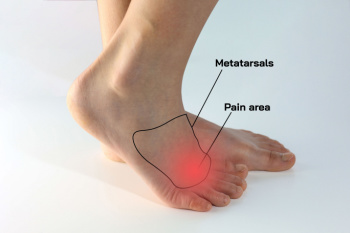Connect With Us
Blog
Nerve Pain in the Foot

Experiencing nerve pain in your foot can impact your daily activities and overall quality of life. One common cause of such pain is Morton's neuroma, a condition where a nerve in the ball of the foot becomes swollen or thickened. This often results from wearing shoes that squeeze the toes together for extended periods, such as high-heeled, tight, or narrow footwear. Symptoms of Morton's neuroma can include a sharp, burning pain in the foot that intensifies with walking and a sensation of a small lump in the ball of the foot, typically between the third and fourth toes. Diagnosis usually involves a physical exam and may require imaging tests like ultrasound, X-ray, or MRI scans to confirm. Switching to shoes that allow ample room for the toes and reducing activities that exacerbate the pain may provide relief. If these measures are insufficient, special pads or devices to spread the toes, steroid injections, or in severe cases, surgery, may be recommended to alleviate symptoms. Persistent nerve pain should not be ignored, as early intervention can prevent further complications. If you are experiencing such pain, consulting a podiatrist is suggested for a comprehensive evaluation and appropriate treatment plan.
Morton’s neuroma is a very uncomfortable condition to live with. If you think you have Morton’s neuroma, contact one of our podiatrists of Community Foot Specialists. Our doctors will attend to all of your foot care needs and answer any of your related questions.
Morton’s Neuroma
Morton's neuroma is a painful foot condition that commonly affects the areas between the second and third or third and fourth toe, although other areas of the foot are also susceptible. Morton’s neuroma is caused by an inflamed nerve in the foot that is being squeezed and aggravated by surrounding bones.
What Increases the Chances of Having Morton’s Neuroma?
- Ill-fitting high heels or shoes that add pressure to the toe or foot
- Jogging, running or any sport that involves constant impact to the foot
- Flat feet, bunions, and any other foot deformities
Morton’s neuroma is a very treatable condition. Orthotics and shoe inserts can often be used to alleviate the pain on the forefront of the feet. In more severe cases, corticosteroids can also be prescribed. In order to figure out the best treatment for your neuroma, it’s recommended to seek the care of a podiatrist who can diagnose your condition and provide different treatment options.
If you have any questions, please feel free to contact our offices located in Beavercreek, Dayton, and Vandalia, OH . We offer the newest diagnostic and treatment technologies for all your foot care needs.
